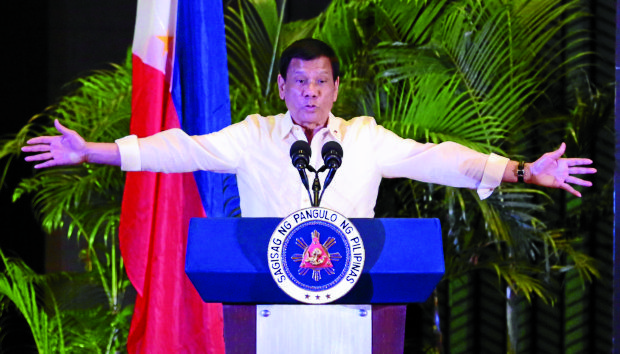Duterte offers authoritarianism as PH panacea
Three turbulent decades after the Philippines shed dictatorship, President Rodrigo Duterte is offering a return to authoritarian rule as a solution to all the problems democracy has failed to fix.
In a series of recent speeches, Duterte has repeatedly said martial law may be needed to save his nation of 100 million people from descending into drug, crime and terrorism-induced anarchy.
BACKSTORY: Duterte to declare martial law if situation in PH turns ‘virulent’
Duterte’s warnings echo back to dictator Ferdinand Marcos, who was toppled in a 1986 “People Power” revolution, and are placing intense scrutiny on the democratic institutions that have been slowly rebuilt since then.
“I think the situation today is the closest we’ve been to an authoritarian form of government in 30 years,” Jose Manuel Diokno, dean of law at Manila’s De la Salle University and one of the nation’s leading human rights lawyers, told Agence France-Presse.
Article continues after this advertisement“There are so many parallels between what’s happening today and what happened before (during the Marcos dictatorship).”
Article continues after this advertisementDiokno said one commonality was a climate of fear, created partly by Duterte’s controversial drug war that has claimed thousands of lives since he took office nine months ago.
READ: ‘Fight the fear’ under Duterte rule, FLAG’s Diokno urges Filipinos
“The situation today is similar to the Marcos period in the sense that both are fuelled by the barrel of the gun,” he said.
Marcos justified his authoritarian rule by what he said was the threat of communism, while Duterte is doing the same based on drugs and criminality, according to Diokno.
Diokno said some relatives of those killed by police and unknown vigilantes feared retribution if they complained, while intimidation tactics were being used against dissenters.
Nevertheless, like US President Donald Trump and other populist leaders around the world who are posing challenges for democracy, Duterte is operating atop a solid base of support.
Many Filipinos have cheered his drug war and believe he is the strongman needed to radically change a deeply corrupt political system that has created one of Asia’s biggest rich-poor divides.
READ: 82% of Metro residents feel safer because of war on drugs–NCRPO
Stress tests
Duterte intends to fundamentally reshape Philippine democracy by changing the constitution to create a federal and parliamentary system.
He has promoted it as a way to end the injustices served out by “Imperial Manila”, portraying the capital as home to corrupt elites — in much the same way that Trump has described Washington as a “swamp” that must be drained.
The president’s many supporters believe federalism can work and, with a commanding majority in Congress, he will be able to achieve it.
His critics fear constitutional change, which currently limits the president to a single term of six years, could cement authoritarian rule.
Duterte has further raised alarm by proposing the return of the Marcos-era Philippine Constabulary, a combined military and police force that was one of the dictator’s main ways of suppressing dissent.
He also last week raised the prospect of bringing back a Marcos order allowing security forces to conduct searches and arrests without warrants.
“It is a cruel process and it is taken care of by the military,” Duterte said of warrantless arrests, referring in that context to him being “just like Mr. Marcos”.
With his style of governing, Duterte is subjecting the Philippines’ democratic institutions to stress-tests, according to Ronald Mendoza, the Harvard-educated dean of the school of government at Ateneo University in Manila.
But Mendoza said this could turn out to be a positive by identifying the weakest parts of the nation’s young democracy and proving that strong institutions can withstand pressures.
Mendoza cited as one positive the Armed Forces of the Philippines, which responded to Duterte’s warnings of martial law with a statement saying there was no need for it.
The military has also rejected repeated calls by Duterte, a former city mayor and lawyer, to join the police as frontline enforcers in his drug war.
Mendoza pointed to an independent central bank as another bright spot, while Diokno said the Philippines’ feisty media was proving to be an important bulwark for democracy.
Mendoza said Congress and the police force were institutions with weaknesses that had been exposed under Duterte.
But overall he remained cautiously optimistic the Philippines’ democratic institutions and the Filipino people would prevent a slide back to martial law.
“We are in a much stronger place than we were several decades ago,” Mendoza said.
RELATED VIDEO
